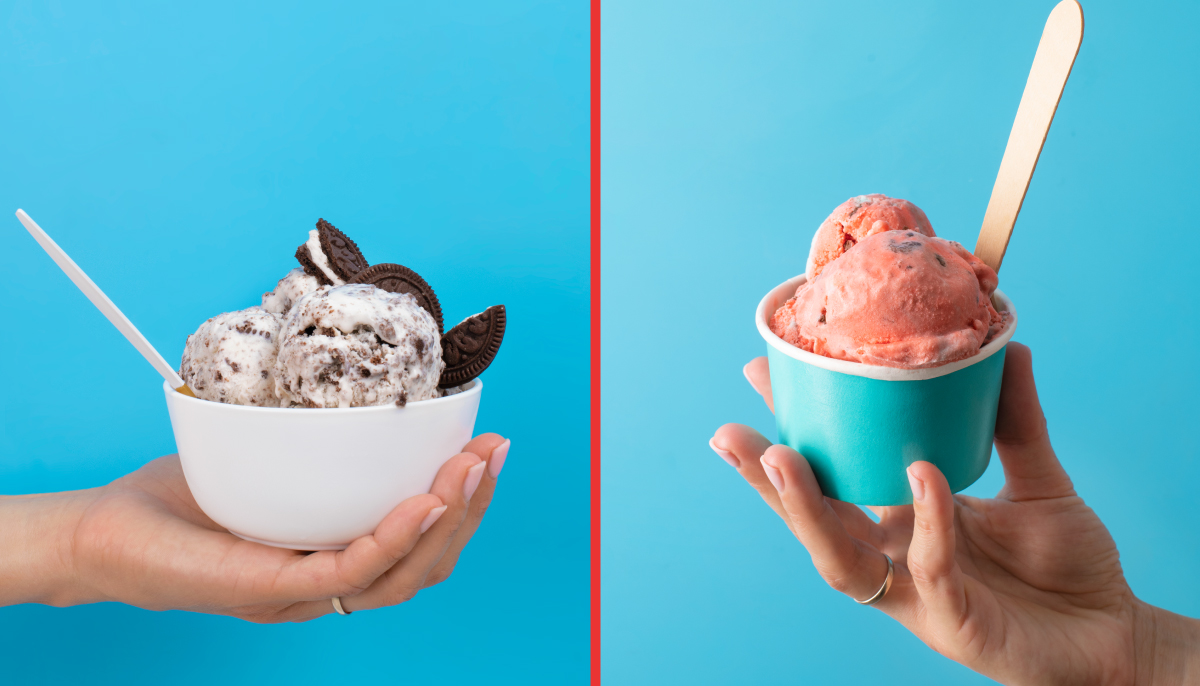If you are thinking about producing ice cream, know the main differences between ice cream and gelato that should be taken into account when choosing your product.
Origin and History
Ice cream and gelato are two very popular frozen desserts, but they have different origins and histories. Ice cream has its roots in ancient China, where it was made from a mixture of rice, milk and snow. Gelato originates in Italy, more precisely in Sicily, where it was made with goat’s milk and snow from Mount Etna.
Ice cream was brought to Europe by the Arabs during the Middle Ages and quickly became popular. Gelato gained prominence in Italy from the 16th century onwards, when it began to be produced on a large scale and became a traditional dessert in the country.
Nowadays, both ice cream and gelato are enjoyed all over the world, each with its own unique characteristics and flavors.
Ingredients and Preparation
The ingredients used to prepare ice cream and gelato are also different. Ice cream is made mainly with milk, cream, sugar and flavorings, and may also contain fruit, chocolate, nuts and other additional ingredients.
Gelato is made with whole milk, sugar and natural flavorings, such as fresh fruit, nuts, chocolate or coffee. Furthermore, gelato has less fat than ice cream, as it uses less cream in its recipe.
The preparation of ice cream and gelato is also different. Ice cream is usually produced in large ice cream machines, which churn the mixture and freeze it at the same time. Gelato is produced in specific gelato machines, which churn the mixture more slowly, incorporating less air and resulting in a denser and creamier texture.
Texture and Consistency
Texture and consistency are other characteristics that differentiate ice cream from gelato. Ice cream is known for being creamier and more aerated, due to the greater amount of air incorporated during the production process. This makes the ice cream lighter and less dense.
Gelato, on the other hand, has a denser and creamier texture, as it is produced with less air incorporated. This is due to the slower preparation process and the smaller amount of fat used in the recipe. The greater density of gelato makes it melt more slowly in the mouth, providing a more intense sensory experience.
Fat and Sugar Content
The fat and sugar content also differs between ice cream and gelato. Ice cream generally has a higher fat content, due to the presence of cream in its composition. Additionally, ice cream may contain a higher amount of sugar, depending on the recipe used.
On the other hand, gelato has less fat, as it uses less cream in its preparation. Furthermore, gelato also has less sugar, as it uses natural flavorings to enhance the flavor of the main ingredients.
These differences in fat and sugar content make gelato considered a healthier option compared to ice cream, especially for those who are concerned about their calorie intake.
Variety of Flavors
As for the variety of flavors, both ice cream and gelato offer a wide range of options. Ice cream is known for its variety of flavors, ranging from classics, such as vanilla and chocolate, to more exotic options, such as pistachio, dulce de leche and cookies and cream.
Gelato also offers a wide variety of flavors, with emphasis on traditional Italian flavors, such as stracciatella, nocciola (hazelnut) and cioccolato (chocolate). Furthermore, gelato tends to have a more intense and authentic flavor, due to the use of fresh and natural ingredients.
Ultimately, the choice between ice cream and gelato will depend on each person’s personal taste. Both desserts are delicious and can be enjoyed on different occasions. So the next time you’re in the mood for a cold dessert, try both ice cream and gelato and find out which one is your favorite.
At Finamac™ you will find machines that produce Gelato, Ice Cream, Popsicles and Açaí.
If you are still unsure about which one to produce, sign up for our courses – in addition to learning everything about production, you will have an overview of the business.
